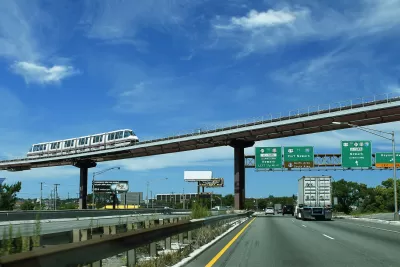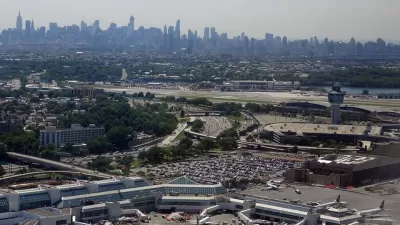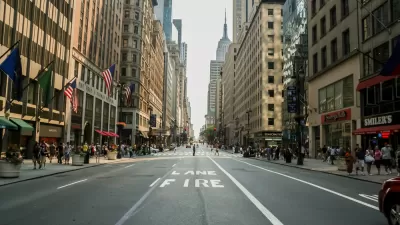With the governor stepping down, the state's transit agencies have an opportunity to reevaluate controversial projects and shift their priorities.

As Governor Cuomo steps down from his post amid scandal, writes Alissa Walker, the state gets 'a reprieve' from transportation policies that, according to a letter from Port Authority staffers, were made through "non-transparent, politically motivated decisions, including decisions that squander the trust and money of our bondholders, customers, and the general public." The letter also called for halting the controversial AirTrain project, championed by Cuomo.
According to Stephen Nessen, "[a]s governor, Cuomo has lorded over transportation projects for better and worse, and has called the shots from Albany on many matters that affect the daily commute in the New York City region. Most prominently, he controls the MTA by recommending the majority of its 21 board members, and approving all of them." Walker argues this holds true for other proposals that withered on the governor's desk, including congestion pricing, which could raise as much as one billion dollars a year for public, and "the Fast Forward proposal for the MTA, an ambitious, necessary, achievable vision proposed by New York City Transit head Andy Byford to make the subway system more efficient and accessible and then derailed by the governor’s ego."
As federal funds from the Infrastructure Investment and Jobs Act starts to flow into the state, Walker writes, "[t]he big question for Kathy Hochul — who will become the state’s first woman governor in two weeks — is whether she can dismantle the gubernatorial institutions that wreaked havoc on the state’s transportation systems."
FULL STORY: We Just Got a Reprieve From Cuomo’s Worst Transit Ideas

Study: Maui’s Plan to Convert Vacation Rentals to Long-Term Housing Could Cause Nearly $1 Billion Economic Loss
The plan would reduce visitor accommodation by 25,% resulting in 1,900 jobs lost.

North Texas Transit Leaders Tout Benefits of TOD for Growing Region
At a summit focused on transit-oriented development, policymakers discussed how North Texas’ expanded light rail system can serve as a tool for economic growth.

Using Old Oil and Gas Wells for Green Energy Storage
Penn State researchers have found that repurposing abandoned oil and gas wells for geothermal-assisted compressed-air energy storage can boost efficiency, reduce environmental risks, and support clean energy and job transitions.

Private Donations Propel Early Restoration of Palisades Playground
Los Angeles has secured over $1.3 million in private funding to restore the Pacific Palisades playground months ahead of schedule, creating a modern, accessible space that supports community healing after recent wildfires.

From Blight to Benefit: Early Results From California’s Equitable Cleanup Program
The Equitable Community Revitalization Grant (ECRG) program is reshaping brownfield redevelopment by prioritizing projects in low-income and environmental justice communities, emphasizing equity, transparency, and community benefits.

Planting Relief: Tackling Las Vegas Heat One Tree at a Time
Nevada Plants, a Las Vegas-based nonprofit, is combating the city’s extreme urban heat by giving away trees to residents in underserved neighborhoods, promoting shade, sustainability, and community health.
Urban Design for Planners 1: Software Tools
This six-course series explores essential urban design concepts using open source software and equips planners with the tools they need to participate fully in the urban design process.
Planning for Universal Design
Learn the tools for implementing Universal Design in planning regulations.
Ascent Environmental
Borough of Carlisle
Institute for Housing and Urban Development Studies (IHS)
City of Grandview
Harvard GSD Executive Education
Toledo-Lucas County Plan Commissions
Salt Lake City
NYU Wagner Graduate School of Public Service




























